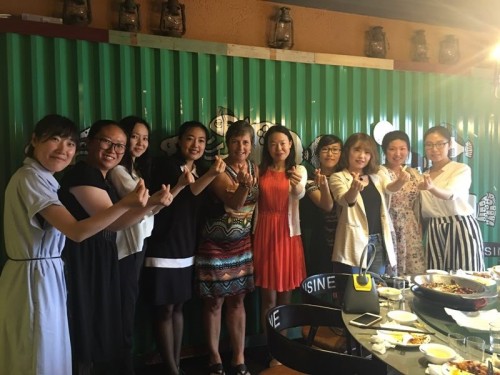I am very pleased to welcome Morgane Michael as my blog guest this week. Morgane is an amazing educator from Vancouver Island and the creator of the SMALL ACT BIG IMPACT 21-DAY-CHALLENGE,and the producer of KindSight 101 Podcast, in which I was honoured to have participated. In this post she shares her kindness journey with us.
Journey to Small Act Big Impact
As an educator for over ten years, I’ve always cared deeply about making those around me feel valued and seen. Many people, including many of our colleagues, parents, and students, suffer from anxiety, depression, and the effects can be devastating. In my heart, I believe that the small ways in which we connect to others, whether through a smile or an off-handed casual conversation, can make all the difference. I enjoy finding creative ways to explore the concept of deep kindness, especially within the context of our school communities.
It wasn’t until a moment of personal reckoning, that I truly learned about the trans-formative power of kindness. It would be a turning point for me and for my career. With two children under the age of five, I suddenly began experiencing severe dizziness, began bumping into walls, and was so nauseous I couldn’t hold down food. After a diagnosis of severe vertigo, I was hospitalized and spent over a week in bed, completely unable to care for my children or do virtually anything. During this difficult time, we received an enormous outpouring of help from family and friends. It was then when I realized just how difficult it was for me to accept these acts of kindness.
Not only does our culture discourage receiving help and kindness (think of how difficult it is to receive and accept a compliment about our character, achievements or clothing without deflecting, when someone offers to pay for the bill at a restaurant, when someone offers you help in a time of need), but it values and rewards over-functioning independence. As Dr. Brené Brown, famed author of Daring Greatly asserts, “we fall prey to the myth that successful people are those who help rather than need, and broken people need rather than help.”
The Birth of the 21-Day Kindness Challenge
My experience sparked an inquiry project, of sorts. I began reading about kindness in leadership, schools, and communities. I learned that we are wired for kindness, that our brain rewards altruism by infusing us with a cocktail of happiness hormones that have been nicknamed the “Helper’s High,” and most incredibly, that kindness is contagious. I started thinking of ways that these concepts could be incorporated into my practice as an elementary school teacher. That’s when I came up with the 21-Day Kindness Challenge. Kindness literally has the power to change workplace, school, and community culture because of its positive ripple effects. What if we could positively influence a school or workplace culture as a result of making kindness a habit?
The 21-Day Small Act Big Impact Kindness Challenge starts with a conscious commitment from individuals to come up with meaningful ways to add value to their school, workplace, and community cultures throughout a dedicated 21-day period. Several exciting ‘spin-off’ projects have resulted as a result of this inquiry into kindness including my blog, podcast, and an upcoming book.
Throughout the course of 2017-2018, I spent time piloting the 21-Day Kindness Challenge across a number of Elementary and Middle Schools within the Victoria, Sooke, and Saanich Districts on Vancouver Island. Students from K-8 loved and resonated with the concept of kindness. The idea gained traction and soon I even heard from teachers who had embraced the challenge within their high-school classrooms through twitter and social media. I spent many Fridays going into schools for launch assemblies and teaching mini-lessons to dozens of classrooms. I have a number of resources including a short animated video, kindness trackers, and lessons that provide teachers with a additional resources to kickstart their own kindness challenge. A lot of the success of the challenge stems from the students taking agency over their impactful action.
This year, as I return back to school after an extended leave with my young kids, I will continue piloting the challenge in my own classroom and incorporating some important kindness metrics (developed by Dr. Binfet from UBC) to measure the effects of kindness on our overall happiness and kindness within the school. I’ll be sharing the roadmap and some of the “How-to’s” in upcoming Pro-D workshops and conferences in Victoria and at the CrossCurrents 2019 Conference.
Here are some of the ways our students have served their schools, communities, and world through the 21-Day Kindness Challenge:
- Sock drives for the homeless
- Creating art for senior’s homes
- Musical performances in group homes for individuals with special needs
- Baking cookies for local hospital family support centres
- Engaging in recycling and other environmental projects
- Raising money for peace-promotion and disaster relief through organizations like Red Cross and Peace Direct
- Delivering care packages to children receiving chemotherapy cancer treatment
- Sending letters and encouraging notes to on-duty members of the military
- Dedicating themselves to small, intentional kindnesses on a daily basis that benefit their classmates, family, and school environment
KindSight 101 Podcast:
The Small Act Big Impact Kindness project led me to further explore the idea of kindness in our community. I have had honour of interviewing over 40 individuals (including Adrienne Gear) for KindSight 101, the podcast designed for educators and leaders to accompany the Small Act Big Impact kindness mission. I’ve spoken to educators, principals, Nobel Peace Prize nominees, YouTube stars, authors, counselors, TED talk speakers, and parenting gurus. These amazing folks have taught me that everyone has a story and one single thread connects all of us…we all wish to be seen, heard and understood. They’ve also shared tangible actionable strategies and ways to infuse our classrooms and homes with authentic generosity. When we can lead with compassion, empathy, and follow-through with deep, intentional kindness toward one another, we are able to create deep meaningful lives with beautiful relationships.
On a personal note, after having had one of the most incredibly rewarding, gold-mine podcast interviews with Adrienne, my computer glitched, the software we were using to stage and record the interview crashed unexpectedly, and I lost the full hour-and-a-half interview! Cue panicked hyperventilation! With Adrienne’s generous nature (and some re configuring of technical equipment), we were able to reschedule and rerecord the interview. I’d like to say that it was even better than the first! You can check out Adrienne’s podcasts here:
Episode #9 Hmmm…Huh? Aha! Tangible Proven Ways to Develop Powerful Understanding P1 https://itunes.apple.com/ca/podcast/9-hmmm-huh-aha-tangible-proven-ways-to-develop-powerful/id1412489005?i=1000416027246&mt=2
Episode #10 Hmmm…Huh? Aha! Tangible Proven Ways to Develop Powerful Understanding P2 https://itunes.apple.com/ca/podcast/10-hmmm-huh-aha-tangible-proven-ways-to-develop-powerful/id1412489005?i=1000416027298&mt=2
Episode #35 But, I’m not Indigenous: How to Explore Indigenous Ways of Learning https://itunes.apple.com/ca/podcast/35-but-im-not-indigenous-how-to-explore-indigenous/id1412489005?i=1000416027254&mt=2
My New Book Kindness and Homelessness – Inquiry for the Middle-School Classroom I am very excited to be in the process of writing a book about homelessness and kindness for middle school classrooms. Through first-hand stories, my goal is to invite young readers to discover the realities, profiles, and causes of homelessness. Readers will be encouraged to step outside of your own experience and gain a deep understanding of what it means to live without a home. Most importantly, I hope to educate youth to learn about actionable ways to use kindness to help those affected by homelessness. The book is set to be released in early 2020 through Orca Publishers.
Final Thoughts:
At the end of the day, we must ask ourselves daily whether we are proud of our interactions. It comes down to choosing integrity over what feels easy. Taking care of the members in our communities reinforces that they matter. When we can lead with compassion, empathy, and follow-through with deep, intentional kindness toward one another, we are able to create deep meaningful lives with beautiful relationships.

Morgane Michael has been a teacher for over 10 years and is the founder of the not-for-profit Small Act Big Impact 21-Day Kindness Challenge (started in August of 2017). Through professional development workshops and within her Grade 2/3 classroom in the Greater Victoria School District, she teaches kids, parents, and educators how to harness the mobilizing power of kindness to make a big impact on the world, one small act at a time. When she isn’t teaching, reading, writing, or interviewing fascinating new guests for her podcast, KindSight 101, you can find her at boot camp, camping, catching up with friends, playing with her two kids, or enjoying some down time with her husband. She lives with her family in Victoria, BC and feels tremendous gratitude for the beautiful nature that surrounds them.
Connect with Morgane and explore more of her Kindness Journey :
Youtube: https://www.youtube.com/watch?v=3Mq3lAU1TQ4
Website: smallactbigkindness.com
Blog: smallactbigimpact/blog.com
Instagram: https://www.instagram.com/smallactbigimpact/
Facebook:https://www.facebook.com/smallactbigimpact21days/
Twitter: https://twitter.com/sabi21days?lang=en
Linked-In: Small Act Big Impact (Teacher)
YouTube Channel: https://youtu.be/3Mq3lAU1TQ4
Suggested hashtags: #vulnerability #kindness #smallactbigimpact #smallactbigimpact21days #21daykindnesschallenge #momsofinstagram #momblogger












